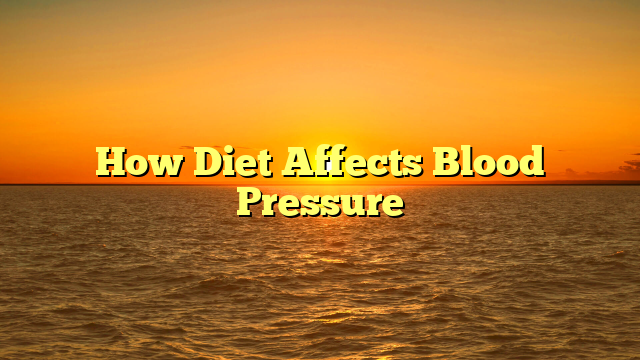How Diet Affects Anxiety
Did you know that what you eat can have a significant impact on your anxiety levels? It’s true! In this article, we will explore the fascinating connection between your diet and anxiety. We’ll discuss how certain foods can either exacerbate or alleviate anxiety symptoms, as well as provide practical tips on how to make healthier dietary choices that promote mental well-being. So, if you’re looking to better understand the power of your plate in managing anxiety, keep reading!
Physical Health and Anxiety
Gut-Brain Connection
The gut and the brain are closely interconnected, and this connection is known as the gut-brain axis. Research has shown that imbalances in the gut microbiome can contribute to the development and exacerbation of anxiety symptoms. The gut microbiome refers to the diverse community of microorganisms that reside in the digestive tract. These microorganisms play a crucial role in maintaining overall health, including mental health. When the gut microbiome is imbalanced, it can lead to inflammation, neurotransmitter imbalances, and impaired gut barrier function, all of which can contribute to anxiety.
Inflammation and Anxiety
Inflammation, which is the body’s immune response to injury or infection, has been linked to the development of anxiety. Chronic inflammation can disrupt the balance of neurotransmitters in the brain, leading to mood disturbances and anxiety. Inflammatory markers, such as cytokines, have been found to be elevated in individuals with anxiety disorders. Additionally, research has shown that anti-inflammatory interventions, such as dietary changes, can help reduce anxiety symptoms.
Nutrient Deficiencies and Anxiety
Certain nutrient deficiencies have been linked to an increased risk of developing anxiety. For example, deficiencies in B vitamins, magnesium, and zinc can contribute to anxiety symptoms. B vitamins, such as vitamin B6 and B12, play a crucial role in brain function and the production of neurotransmitters involved in mood regulation. Magnesium is involved in over 600 biochemical reactions in the body, including those that regulate mood and anxiety. Zinc is essential for the proper functioning of the brain and has been found to have antidepressant properties. Ensuring an adequate intake of these nutrients through a balanced diet or supplementation can help support mental well-being and reduce anxiety symptoms.
Sugar and Anxiety
The Impact of Sugar on the Brain
Consuming excessive amounts of sugar can have a detrimental impact on brain health and contribute to the development or worsening of anxiety symptoms. When we consume sugar, the brain releases dopamine, a neurotransmitter associated with pleasure and reward. This dopamine release creates a temporary feeling of euphoria, which can lead to cravings for more sugar. However, prolonged excessive sugar intake can disrupt the brain’s reward system and lead to imbalances in neurotransmitters, such as serotonin, that regulate mood and anxiety.
Blood Sugar Levels and Anxiety
Consuming large amounts of sugary foods can cause a rapid spike in blood sugar levels, followed by a rapid drop. This rollercoaster effect can contribute to feelings of anxiety, irritability, and fatigue. Fluctuating blood sugar levels can also affect serotonin levels, which can further impact mood and anxiety. Maintaining stable blood sugar levels through a balanced diet and avoiding excessive sugar consumption can help support stable mood and reduce anxiety symptoms.
Sugar Withdrawal Symptoms
Reducing or eliminating sugar from your diet can lead to withdrawal symptoms, similar to those experienced when quitting drugs or alcohol. Common sugar withdrawal symptoms can include mood swings, anxiety, irritability, cravings, and fatigue. These symptoms typically subside within a few days to a couple of weeks as the body adjusts to the absence of sugar. It’s important to be aware of these potential withdrawal symptoms and to approach sugar reduction or elimination gradually to minimize their impact on your mental well-being.

Caffeine and Anxiety
Stimulant Effects on Anxiety
Caffeine is a stimulant that can increase feelings of alertness and energy. While some individuals may enjoy the immediate boost in mood and focus that caffeine provides, excessive consumption of caffeine can exacerbate anxiety symptoms. Caffeine stimulates the release of adrenaline and cortisol, stress hormones that can increase heart rate, blood pressure, and feelings of anxiety. Furthermore, caffeine can interfere with sleep, which is crucial for managing anxiety. It’s advisable to limit caffeine intake, especially if you are prone to anxiety or panic attacks.
Link between Caffeine and Panic Attacks
Caffeine has been known to trigger or worsen panic attacks in individuals susceptible to anxiety disorders. Consuming high amounts of caffeine can increase heart rate, blood pressure, and feelings of restlessness, which can mimic the symptoms of a panic attack. If you are prone to panic attacks or have been diagnosed with an anxiety disorder, it is recommended to reduce or eliminate caffeine from your diet to help manage symptoms and improve overall well-being.
Role of Sleep Disruption
Caffeine consumption, particularly later in the day, can disrupt sleep patterns and lead to insomnia. Sleep disturbances are closely linked to anxiety, as lack of quality sleep can increase feelings of restlessness, irritability, and anxious thoughts. It is important to be mindful of your caffeine intake and to avoid consuming it close to bedtime to ensure a good night’s sleep and support your mental health.
Omega-3 Fatty Acids and Anxiety
Effects of Omega-3 Fatty Acids on Anxiety
Omega-3 fatty acids are essential fats that have been shown to have numerous health benefits, including reducing anxiety symptoms. These fats play a crucial role in brain function and are involved in the production of neurotransmitters that regulate mood, including serotonin. Research has shown that individuals with lower levels of omega-3 fatty acids may be more prone to anxiety disorders. Supplementing with omega-3 fatty acids or incorporating food sources rich in these fats, such as fatty fish, flaxseeds, and chia seeds, into your diet can help support mental well-being and reduce anxiety symptoms.
Sources of Omega-3 in the Diet
Incorporating omega-3 fatty acids into your diet can be done through both animal and plant-based sources. Fatty fish, such as salmon, mackerel, and sardines, are excellent sources of omega-3 fatty acids. Plant-based sources include flaxseeds, chia seeds, walnuts, and hemp seeds. If you are unable to obtain sufficient amounts of omega-3 through your diet alone, supplementation with fish oil or algae-based omega-3 supplements may be beneficial.
Supplementation and Anxiety Reduction
Supplementation with omega-3 fatty acids has been shown to have a positive impact on anxiety symptoms. Research suggests that omega-3 supplementation can reduce inflammation, regulate neurotransmitter activity, and improve brain health, all of which can contribute to a reduction in anxiety. It is important to consult with a healthcare professional before starting any supplementation regimen to determine the appropriate dosage and ensure it aligns with your individual needs.

Probiotics and Anxiety
The Role of Gut Bacteria in Mental Health
The trillions of bacteria that reside in our gut, collectively known as the gut microbiota, play a vital role in our physical and mental health. Research has shown that imbalances in the gut microbiota can impact brain function and contribute to the development of anxiety and other mental health disorders. The gut microbiota produce neurotransmitters, regulate inflammation, and interact with the immune system, all of which can influence mental well-being. Probiotics, which are beneficial bacteria, can help restore and maintain a healthy gut microbiota, potentially reducing anxiety symptoms.
Probiotics as a Potential Treatment for Anxiety Disorders
Emerging research suggests that certain strains of probiotics may have a positive impact on anxiety symptoms. Studies have found that supplementing with probiotics can reduce anxiety, improve mood, and enhance the response to stress. However, more research is needed to fully understand the mechanisms behind these effects and to determine the most effective strains and dosages of probiotics for anxiety management. It is important to consult with a healthcare professional before starting any new supplements to ensure they are appropriate for your individual health needs.
Fermented Foods and Anxiety
Fermented foods, such as yogurt, kimchi, sauerkraut, and kefir, naturally contain beneficial bacteria and can help promote a healthy gut microbiota. In addition to supplementing with probiotics, incorporating fermented foods into your diet can provide a natural source of beneficial bacteria. These foods can support gut health and potentially reduce anxiety symptoms. Experiment with various fermented foods and find ones that you enjoy to incorporate regularly into your meals.
Processed Foods and Anxiety
Negative Impact of Processed Foods on Mental Health
Processed foods, such as fast food, packaged snacks, and sugary beverages, are often high in unhealthy fats, sugar, and artificial ingredients. Consuming these foods regularly can have a negative impact on mental health and contribute to the development or worsening of anxiety symptoms. Highly processed foods lack the essential nutrients needed for optimal brain function and can promote inflammation and imbalances in neurotransmitters, both of which can contribute to anxiety.
High Sugar and Fat Content
Processed foods are often packed with high amounts of added sugars and unhealthy fats. Excessive sugar consumption can lead to blood sugar imbalances, mood swings, and increased feelings of anxiety. Unhealthy fats, such as trans fats and saturated fats, can contribute to inflammation and impair brain function, potentially worsening anxiety symptoms. Opting for whole, unprocessed foods that are rich in nutrients and natural fats can help support mental well-being.
Artificial Ingredients and Food Additives
Many processed foods contain artificial ingredients and food additives, such as artificial sweeteners, flavor enhancers, and preservatives. These additives have been linked to negative effects on mental health and can disrupt normal brain function. Some individuals may be more sensitive to these additives and experience increased anxiety or other mood disturbances. Choosing whole, minimally processed foods and reading food labels to avoid artificial ingredients can help support mental well-being and reduce anxiety symptoms.

Micronutrients and Anxiety
Vitamin B and Anxiety
B vitamins, including vitamin B6, vitamin B12, and folate, play a crucial role in brain function and the production of neurotransmitters involved in mood regulation. Deficiencies in these vitamins have been linked to an increased risk of anxiety and other mental health disorders. It is important to ensure an adequate intake of B vitamins through a balanced diet or supplementation to support mental well-being and reduce anxiety symptoms.
Magnesium Deficiency and Anxiety Symptoms
Magnesium is an essential mineral that is involved in over 600 biochemical reactions in the body, including those that regulate mood and anxiety. Low levels of magnesium have been associated with increased anxiety symptoms. Ensuring an adequate intake of magnesium through food sources, such as leafy green vegetables, nuts, and seeds, or through supplementation, can help support optimal brain function and reduce anxiety.
The Role of Zinc in Anxiety
Zinc is an important mineral that is involved in brain function and has been found to have antidepressant properties. Deficiencies in zinc have been associated with an increased risk of anxiety and other mood disorders. Consuming zinc-rich foods, such as oysters, red meat, pumpkin seeds, and legumes, or supplementing with zinc, can help support mental well-being and reduce anxiety symptoms.
The Mediterranean Diet and Anxiety
Introduction to the Mediterranean Diet
The Mediterranean diet is a way of eating that is inspired by the traditional dietary patterns of countries bordering the Mediterranean Sea. It is characterized by an abundance of fruits, vegetables, whole grains, legumes, nuts, and seeds, with minimal red meat and saturated fats. This dietary pattern has been shown to have numerous health benefits and is associated with a reduced risk of various chronic diseases, including mental health disorders.
Benefits of the Mediterranean Diet for Mental Health
Research has found that adherence to the Mediterranean diet is associated with a lower risk of developing anxiety and depression. The Mediterranean diet is rich in nutrients, such as omega-3 fatty acids, B vitamins, magnesium, and antioxidants, which have been linked to improved mental well-being and a reduced risk of anxiety symptoms. Additionally, the Mediterranean diet promotes a healthy gut microbiota, which is crucial for mental health.
Key Components and Foods in the Mediterranean Diet
The key components of the Mediterranean diet include an emphasis on whole, plant-based foods, such as fruits, vegetables, whole grains, legumes, nuts, and seeds. Moderate consumption of fish and seafood, lean proteins (such as poultry), and dairy products (such as yogurt and cheese) is also encouraged. Red meat and processed foods are limited. Healthy fats, such as olive oil, are a staple of the Mediterranean diet. Herbs and spices are used to flavor dishes instead of salt. By following the principles of the Mediterranean diet, you can nourish your body with the nutrients it needs to support mental well-being and reduce anxiety.
Food Sensitivities and Anxiety
Common Food Sensitivities and Their Impact on Anxiety
Food sensitivities occur when the immune system reacts negatively to certain foods or food components. While food allergies typically cause immediate and often severe reactions, food sensitivities may result in more subtle symptoms, such as anxiety. Common food sensitivities that have been linked to anxiety include gluten, dairy, and certain food additives, such as artificial sweeteners and monosodium glutamate (MSG). Identifying and eliminating these trigger foods from your diet can help alleviate anxiety symptoms.
Elimination Diets and Anxiety Management
An elimination diet involves temporarily removing potentially problematic foods from your diet and then gradually reintroducing them one by one to determine if they are causing any adverse reactions. This approach can be beneficial for individuals who suspect they have food sensitivities that may be contributing to anxiety symptoms. By systematically eliminating and reintroducing specific foods, you can identify triggers and adjust your diet accordingly to reduce anxiety symptoms.
Biochemical Individuality and Food Reactions
It’s important to recognize that people’s reactions to different foods can vary greatly due to their unique biochemical makeup. While certain foods may trigger anxiety symptoms for one person, they may not have the same effect on someone else. Keeping a food diary and paying attention to any changes in mood or anxiety symptoms can help you identify potential trigger foods. Working with a healthcare professional or registered dietitian can also provide personalized guidance to help manage anxiety through dietary modifications.
Alcohol and Anxiety
Alcohol as a Central Nervous System Depressant
Alcohol is a central nervous system depressant that can initially provide a temporary sense of relaxation. However, excessive alcohol consumption can have negative effects on mental health, including anxiety. Alcohol affects the balance of neurotransmitters in the brain and can disrupt normal brain function, leading to increased feelings of anxiety and even triggering panic attacks in some individuals.
The Link between Alcohol and Anxiety Disorders
Research has shown a strong link between alcohol use disorders and anxiety disorders. Excessive alcohol consumption can lead to increased anxiety symptoms, and individuals with anxiety disorders may turn to alcohol as a means of self-medication. However, this can create a vicious cycle, as alcohol can further worsen anxiety symptoms and lead to a dependence on alcohol to cope with anxiety.
Effects of Alcohol Withdrawal
If you regularly consume alcohol and then abruptly stop or significantly reduce your intake, you may experience alcohol withdrawal symptoms. These symptoms can include heightened anxiety, irritability, tremors, sweating, insomnia, and even seizures in severe cases. It is important to seek professional help if you are experiencing alcohol withdrawal symptoms to ensure a safe and supported detoxification process. Additionally, avoiding or reducing alcohol intake can be beneficial for managing anxiety and promoting overall mental health.
In conclusion, it is evident that diet plays a crucial role in the management and prevention of anxiety. By understanding the impact of certain foods and nutrients on mental well-being, you can make informed choices to support your physical health and reduce anxiety symptoms. Incorporating a balanced diet rich in whole, unprocessed foods, along with lifestyle modifications such as reducing sugar and caffeine intake, can help promote mental well-being and create a foundation for overall health and happiness. Remember, small changes in your diet and lifestyle can have a significant positive impact on your anxiety levels, so start making those changes today. You deserve to feel your best!









